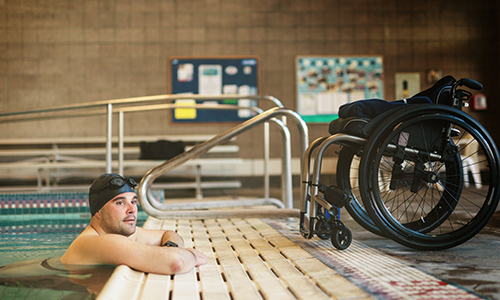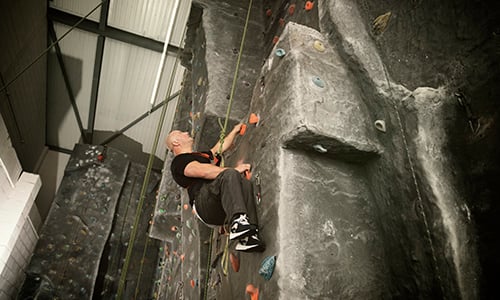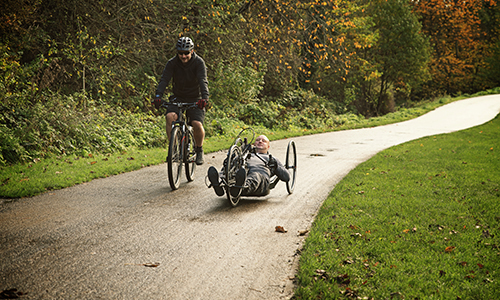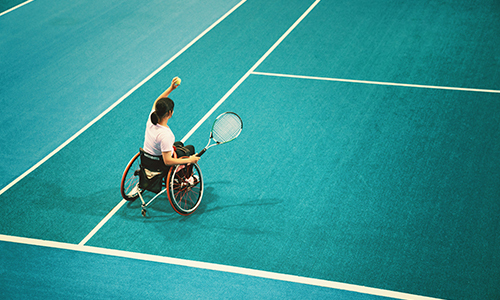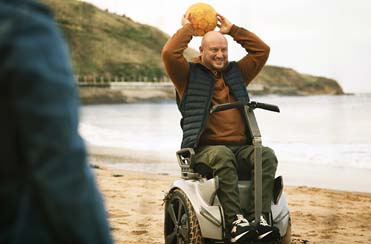Water sports and other activities on the waves bring opportunities for a newfound sense of freedom. Water buoyancy and other unique factors make diving in fun.
Many people with a spinal cord injury enjoy adaptive water sports and aquatic activities. There are many reasons for this—connecting with nature, the social aspect, and enjoying something new. Buoyancy is particularly enjoyable for those activities where you are in the water, such as swimming, scuba diving, and snorkeling. Propelling yourself forward in or under the water can provide a sense of newfound freedom and mobility that you can’t get on land.
Adaptive water sports to try after a spinal cord injury
Fortunately, you have many options to choose from. Try some of these adaptive water sports and aquatic adventures to help keep you healthy, fit, and enjoying life:
Swimming: Enjoy an invigorating workout that can help boost your flexibility, strength, and stamina with less chance of an injury than other sports or exercises. Best of all, once you find a local pool, you just need a good pair of goggles and a swimsuit to participate. All pools are required to have disability access equipment, and lifeguards are trained in how to assist.
Scuba diving: If you want to experience some real adventure, scuba diving offers a chance to experience an amazing underwater world. Many scuba centers offer travel packages, so you can see the world while experiencing these wonders. Diving is also a partner water sport, so you’ll be working with nondisabled people in a socially engaging team environment. Visit your local dive center for lessons and certification as well as help purchasing or renting equipment.
Snorkeling: If you’re not quite ready to dive deeper into the water with scuba diving, snorkeling offers a simpler way to enjoy the benefits of buoyancy. Although it doesn’t involve as much gear as scuba, be sure to visit your local dive shop for a quality mask, snorkel gear, and fins as well as classes and local or travel destination opportunities. It’s also a good idea to practice in a pool before heading out to the open water.
Surfing: Adaptive surfing technique and gear make it possible for you to hit the waves safely. Although you’ll likely need the help of caregivers and volunteers for each surfing excursion, the effort and an investment in an adaptive board are worth it. Surfing offers an energizing way to enjoy fun in the sun along with fitness benefits. Check local surfing clubs for adaptive equipment and assistive programs.
Water skiing: Relish in the fun and excitement of waterskiing using adaptive equipment. Water skiing options include a sit-down ski or a single, wide ski with a metal cage attached. Work with your local club on gear selection—outriggers, clamps, and quad bags may be needed for added balance and safety.
Paddle sports: Kayaking, canoeing, rafting, and paddle boarding are water sports that many with a spinal cord injury favor. Kayaks and canoes can be modified with adaptions such as special seating systems. Special hand adaption gear also can help if you have weakness in your hand or wrist.
Dive right into your next adaptive water sport
Adding these adaptive water sports and other aquatic activities as part of your fitness routine can help you stay physically fit and socially engaged. Although some of these water activities require special equipment and assistance entering and exiting the water from caregivers or volunteers, you’ll likely find plenty of local resources willing to help.
References:



